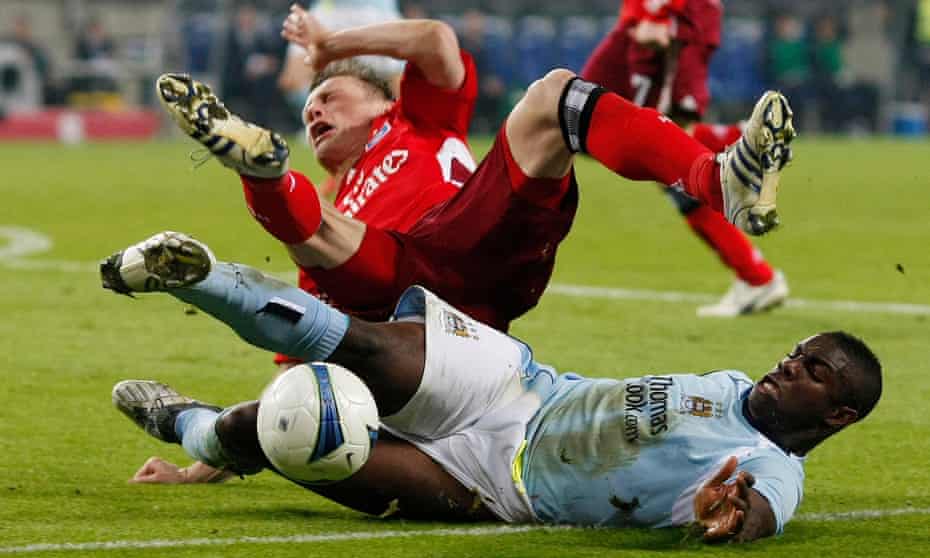‘Everyone thinks I am 45,” Micah Richards says as he ponders whether he has become a role model for young black footballers. The former Manchester City and England defender, forced into early retirement because of injuries, is pointing out he still makes mistakes. The 32-year-old is learning and has found that talking about racism stirs up a lot of emotions on both sides of the divide.
Richards does not pretend to have all the answers. There is a striking moment in his documentary, Tackling Racism in Football, when his father, Lincoln, talks about encountering prejudice as a young man in Britain. They had never spoken about it before.
“I don’t know if it took him to a place where he didn’t want to be,” Richards says as he remembers playing for Leeds City Boys. “He has dreadlocks, a Rastafarian, and people at Leeds City Boys would do casual racism – sing Bob Marley songs. I would get racially abused on the pitch. He would get more racial abuse than me on the sidelines. What can you say to each other?”
Richards remembers being racially abused by police in Chapeltown as a boy. But if you have seen his punditry, you will know he likes to find the positives. His huge laugh deserves a show of its own. Yet it is not always easy to find the right words – as Richards discovered when alleged racism from the fourth official, Sebastian Coltescu, led to Paris Saint-Germain’s game against Istanbul Basaksehir in the Champions League being suspended last month.
Richards was working for the American broadcaster CBS. Coltescu had twice allegedly referred to Basaksehir’s Cameroonian assistant coach, Pierre Webó, as the “black one”, sparking a furious response from Demba Ba, the Turkish side’s striker. But Richards did not rush to condemn the official, even questioning the seriousness of the remark. Some people were not impressed with his argument, particularly on Twitter.
“It was difficult because I only had 30 seconds to look at the incident,” Richards says. In his documentary, Richards talks to Andy Cole, the former Manchester United striker, about mentoring young black players. “I cannot talk for everyone,” he says. “I can only give my experiences and if you want to take something from that, then good. Everyone has to figure out life for themselves. I got abuse when I was on CBS for not condemning an incident straight away.
“I got abuse from my own black community, which was tough. All my life I have been fighting for racial equality. But I have to talk about things that even I am uncomfortable with. I have to make sure I am well briefed, so that I can affect the next generation.”

Richards, who won the Premier League with City in 2012, is undeterred. He retired in 2019, closing the book on a disappointing spell with Aston Villa, and has become a perceptive pundit. He is throwing himself into challenges, fighting discrimination.
Richards focuses on internet abuse in the documentary and speaks to social media executives. “Because there are so many, it’s very hard to pick up every single case,” he says. “They should be doing way more than they are. They need to do more research.
“I can take the abuse because I’ve dealt with it all my life. But I don’t think they understand the impact it has on kids. Imagine if your kid was being abused but no one is doing enough to eradicate it.”
Richards also interviews Gary Neville, who admits he did not know how to react when he was part of England’s coaching staff at Euro 2016 and Raheem Sterling spoke to him about being abused. But Richards is encouraged by the England manager, Gareth Southgate, always seeming to find the right words.
“Gary was sensational,” Richards says. “A lot of people would say: ‘It’s easy to say that now.’ But years ago, even black people didn’t know what to say. It would fall on deaf ears. Now he’s got one of the biggest platforms and he’s speaking about it.
“And look at the stuff that Gareth Southgate’s done about diversity around the England camp. Fabio Capello resigned from England because they stripped John Terry of the captaincy because of the situation with Anton Ferdinand.
“I lost such a lot of respect for Capello. I can’t speak highly enough of Gareth Southgate. He is a white man and doesn’t know what he’s fielding because he’s not been racially abused himself. I’d say the same about Jordan Henderson. It holds more weight when it’s coming from a white person.”
Richards thinks about support from old teammates. “Joe Hart,” he says. “Any time there has been a situation, he would always be the first one to text. He cannot understand but he is trying to understand. He was going through a bad time in his football career. When you go through bad times you think a lot, don’t you? He started looking at wider issues.
“He was talking about racism. He said: ‘How does it make you actually feel?’ I said: ‘It is like you are crying out for help but no one wants to help you.’ He couldn’t believe that he hadn’t spoken about it sooner. James Milner is another one. These guys are diamonds.”
Richards is radiating positivity by now, gushing about Marcus Rashford’s campaigning work, and hopes there will be change. “I am optimistic,” he says. “I think you have to be.”
Micah Richards: Tackling Racism is available on Sky Documentaries and Now TV from Monday at 9pm
from Football | The Guardian https://ift.tt/3oasCFG
via IFTTT

No Comment